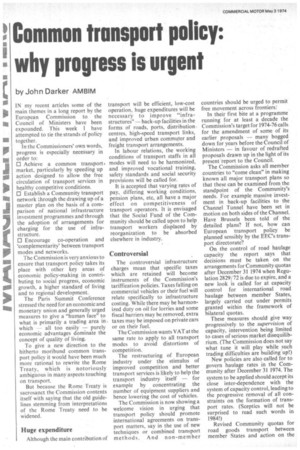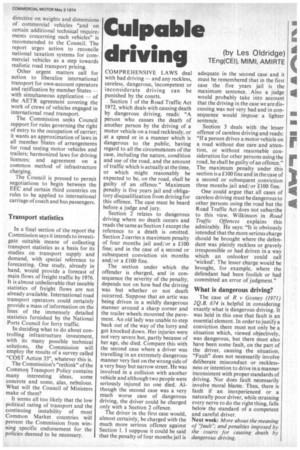Common transport policy: why progress is urgent
Page 44

Page 45

If you've noticed an error in this article please click here to report it so we can fix it.
by John Darker AMBIM IN my recent articles some of the main themes in a long report by the European Commission to the Council of Ministers have been expounded. This week I have attempted to tie the strands of policy together.
In the Commissioners' own words, progress is especially neceSsary in order to: O Achieve a common transport market, particularly by speeding up action designed to allow the free circulation of transport services in healthy competitive conditions.
O Establish a Community transport network through the drawing up of a master plan on the basis of a comparison of national infrastructure investment programmes and through the adoption of arrangements for charging for the use of infrastructure.
O Encourage co-operation and `complementarity' between transport modes and networks.
The Commission is very anxious to ensure that transport policy takes its place with other key areas of economic policy-making in contributing to social progress, economic growth, a higher standard of living and to regional development.
The Paris Summit Conference stressed the need for an economic and monetary union and generally urged measures to give a "human face" to what is primarily a trading area in which — all too easily — purely economic advantages dominate the concept of quality of living.
To give a new direction to the hitherto moribund common transport policy it would have been much more rational to rewrite the Rome Treaty, which is notoriously ambiguous in many aspects touching on transport.
But because the Rome Treaty is sacrosanct the Commission contents itself with saying that the old guidelines stemming from interpretations of the Rome Treaty need to be widened.
Huge expenditure
Although the main contribution of transport will be efficient, low-cost operation, huge expenditures will be necessary to improve "infrastructures" — back-up facilities in the forms of roads, ports, distribution centres, high-speed transport links, and improved urban commuter and freight transport arrangements.
In labour relations, the working conditions of transport staffs in all modes will need to be harmonized, and improved vocational training, safety standards and social security provisions will be called for.
It is accepted that varying rates of pay, differing working conditions, pension plans, etc, all have a major effect on competitiveness of transport operators. It is envisaged that the Social Fund of the Community should be called upon to help transport workers displaced by reorganization to be absorbed elsewhere in industry.
Controversial
The controversial infrastructure charges mean that specific taxes which are retained will become instruments of the Commission's tariffication policies. Taxes falling on commercial vehicles or their fuel will relate specifically to infrastructure costing. While there may be harmonized duty on oil for lorries and some fiscal barriers may be removed, extra taxes may be imposed on private cars or on their fuel.
The Commission wants VAT at the same rate to apply to all transport modes to avoid distortions of competition.
The restructuring of European industry under the stimulus of improved competition and better transport services is likely to help the transport industry itself — for example by concentrating the number of equipment suppliers and hence lowering the cost of vehicles.
The Commission is now showing a welcome vision in urging that transport policy should promote international agreements on transport matters, say in the use of new techniques or combined transport methods. And non-member countries should be urged to permit free movement across frontiers!
In their first bite at a programme running for at least a decade the Commission's target for 1974-76 calls for the amendment of some of its earlier proposals — many bogged down for years before the Council of Ministers — in favour of redrafted proposals drawn up in the light of its present 'report to the Council.
The Commission asks all member countries to "come clean" in making known all major transport plans so that these can be examined from the standpoint of the Community's needs. For example massive invest ment in back-up facilities to the Channel Tunnel have been set in motion on both sides of the Channel.
Have Brussels been told of the detailed plans? If not, how can European transport policy be planned sensibly by the EEC's transport directorate?
On the control of road haulage capacity the report says that decisions must be taken on the arrangements for Community quotas after December 31 1974 when Regu lation 2829/72 is due to expire, and a new look is called for at capacity control for international road haulage between member States, largely carried out under permits granted within the framework of bilateral quotas.
These measures should give way progressively, to the supervision of capacity, intervention being limited to cases of serious market disequilibrium. (The Commission does not say what tune it will play while such trading difficulties are building up!) New policies are also called for to govern haulage rates in the Com munity after December 311974. The system to be applied should accept its close inter-dependence with the system of capacity control, leading to the progressive removal of all constraints on the formation of trans port rates. (Sceptics will not be surprised to read such words in 1984!) Revised Community quotas for road goods transport between member States and action on the directive on weights and dimensions of commercial vehicles "and on certain additional technical require7 ments concerning such vehicles" is recommended to the Council. The report urges action to reconcile national taxation systems for commercial vehicles as a step towards realistic road transport pricing.
Other urgent matters call for action to liberalize international transport for own-account operators and ratification by member States — with simultaneous application — of the AETR agreement covering the work of crews of vehicles engaged in international road transport.
The Commission seeks Council support for rules governing the right of entry to the occupation of carrier; it wants an approximation of laws in all member States of arrangements for road testing motor vehicles and trailers; harmonized laws for driving licences; and agreement on a common method of infrastructure charging.
The Council is pressed to permit negotiations to begin between the EEC and certain third countries on rules to be applied to international carriage of coach and bus passengers.
Transport statistics
In a final section of the report the Commission says it intends to investigate suitable means of collecting transport statistics as a basis for its studies on transport supply and demand, with special reference to forecasting. One study, already in hand, would provide a forecast of main flows of freight traffic by 1976. It is almost unbelievable that useable statistics of freight flows are not already available. International road transport operators could certainly provide a mass of information on the lines of the immensely detailed statistics furnished by the National Ports Council for ferry traffic.
In deciding what to do about controlling infrastructure investment, with its many possible technical solutions, the Commission will employ the results of a survey called "COST Action 33", whatever this is.
The Commission's "rethink" of the Common Transport Policy contains many interesting ideas, some concrete and some, alas, nebulous. What will the Council of Ministers make of them?
It seems all too likely that the low political rating of transport and the continuing instability of most Common Market countries will prevent the Commission from winning specific endorsement for the policies deemed to be necessary,




























































































